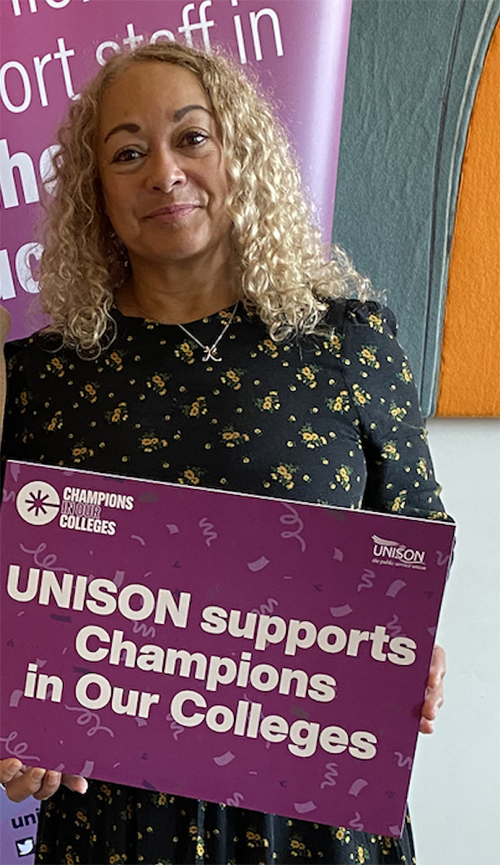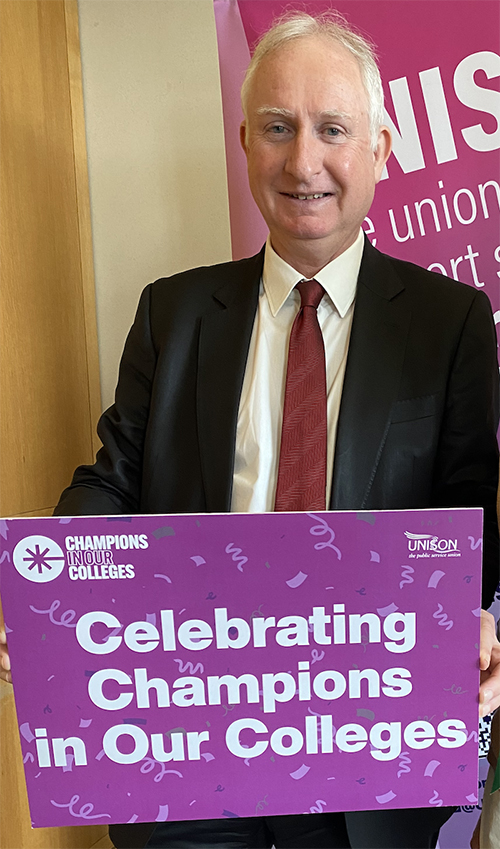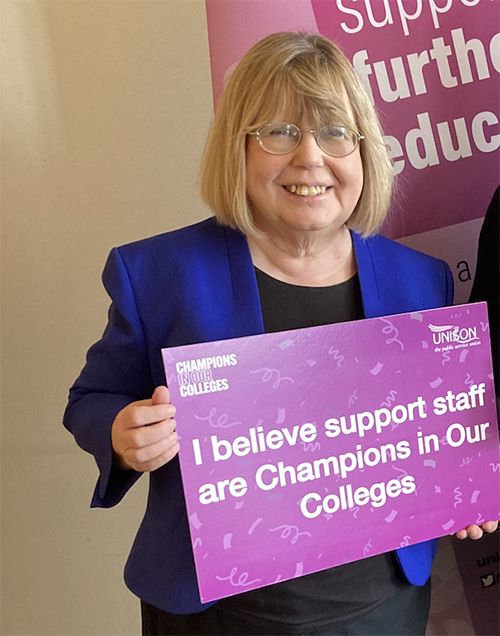Violence, crime and substance misuse are now widespread across colleges, with students regularly carrying weapons and drugs or arriving intoxicated, according to new data released by UNISON today (Thursday).
Seven in ten (70%) support staff said drug abuse among students is a problem in their college, a survey conducted by the union found.
And more than a third (34%) said crime involving weapons is a concern, while almost a fifth (19%) believed gang culture is a problem at their institution.
Three in ten (31%) staff surveyed have had to deal with students who brought drugs into college and two fifths (40%) have had dealings with students who are under the influence of drugs.
Staff described routinely finding weapons such as knives and guns – real and fake – as well as machetes and hammers. Other college workers reported youngsters in possession of crossbows, blades, knuckledusters, screwdrivers, air rifles, ball-bearing (BB) guns, high-powered laser pointers and homemade weapons.
Injuries reported included a member of staff being stabbed in the back with a screwdriver and a student suffering multiple fractures and concussion, as well as bruising all over their body.
Drugs regularly found inside colleges included cannabis, cocaine, ketamine, MDMA and the so-called “zombie” drug Black Mamba, which is a synthetic cannabis.
UNISON’s research – released to coincide with the union’s annual national conference in Brighton – reveals a disturbing picture of violence and substance misuse by young people in colleges across education settings. It also reveals a wide range of weapons and drugs are being brought into colleges.
The survey is based on responses from 780 support staff – including canteen workers, learning-support assistants and librarians – working in both further education and sixth form colleges across the UK.
The data revealed half (50%) of the staff who responded were unaware of their employer’s policy on dealing with students in possession of weapons. And more than seven in ten (73%) said they had no training on how to deal with students who bring weapons or drugs into college. As a result, more than half (53%) thought incidents were not resolved appropriately.
Despite the evident risks, fewer than one in ten (9%) of survey respondents reported that their college used metal detectors, says UNISON.
College workers who said they’d had to deal with students under the influence of drugs and alcohol described young people overdosing, being too high to get through their lessons, or having seizures and hallucinations.
More than a quarter (26%) of respondents said they don’t feel physically safe at work.
Fourteen of years of underfunding have left further education colleges and sixth forms struggling to provide the education and opportunities young people deserve and need, says UNISON.
UNISON wants to see more training, and better security with searches and metal detectors to reduce violence and substance abuse in colleges.
Stricter punishments for students breaking college rules and increased staffing levels are also important ways to deal with the problems, adds the union.
UNISON general secretary Christina McAnea said: “Dangerous behaviour needs to be tackled to ensure students and staff are safe and colleges remain secure environments for young people to learn and thrive.
“Students who think they need to carry weapons for protection or come to college intoxicated are putting their own futures at risk.
“The tremendous strain placed on college staff means they’re forced to put safety and discipline over students’ academic development.
“College leaders must do more to ensure colleges are inspiring, safe places for all.”
Notes to editors:
– Data was gathered from 780 respondents in an online survey conducted by UNISON from 14 May to 7 June 2024.
– Experiences of survey respondents included the following:
When asked to describe incidents involving weapons:
“The most recent incident was earlier this week, where a member of support staff had a knife pulled on them.”
“A student brought in a replica gun, but when police arrived they treated it like it was a real gun. It was terrifying.”
“Staff have been threatened at knifepoint.”
“One student pulled out a machete. Another was attacked and had to be taken to hospital.”
“Knives, slingshots, and imitation guns have all been brought on site.”
“Someone brought weights from a weightlifting bench in their bag, and then used them to smash up a computer keyboard in the library.”
“Two students were fighting over an issue that started outside college and one was stabbed with a pair of scissors.”
“A learner had been carrying a five-inch blade down his sock for weeks.”
“Due to the gang culture where I work, certain places within the college have become no-go areas.”
“Our college is having to employ outside security guards on the front entrance turnstiles.”
“A student was found carrying a large kitchen knife in his bag. He told the tutor it was for protection.”
“A learner brought a sharp blade she used to self-harm on site and ‘lost’ it. It then got into the hands of someone else on campus who threatened to use it on another student.”
When asked to describe incidents involving drugs:
“A student took ketamine during a Monday morning class. They had to be taken away by ambulance and spent a few days in hospital. It was absolutely awful to witness and horrendous for the staff to deal with.”
“I regularly smell cannabis on students. But don’t feel able to confront the smokers.”
“A student left a bottle of methadone in our office.”
“It’s typically cannabis. At times in large quantities. At other times, cocaine, a bag of pills, cannabis vapes. Some keep coke or ketamine in the back of their phones.”
“One student overdosed on ketamine and had a seizure.”
– UNISON is the UK’s largest union with more than 1.3 million members providing public services in education, local government, the NHS, police service and energy. They are employed in the public, voluntary and private sectors.
Media contacts:
Fatima Ayad M: 07508 080383 E: f.ayad@unison.co.uk
Liz Chinchen M: 07778 158175 E: press@unison.co.uk
The article Weapon and drug use ‘widespread’ among students on college premises first appeared on the UNISON National site.


